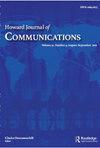Social Determinants of Self-rated Health: Patient-provider Communication, Social Support, Socioeconomics, and Demographics among Different Ethnic Groups in the U.S.
IF 0.8
Q3 COMMUNICATION
引用次数: 0
Abstract
Grounded in the theory of social determinants of health, this study clarifies the relationship between social factors and health disparities in the United States. Health disparities as observed in self-rated health (SRH) status were examined across four different ethnic groups of White, Black, Hispanic, and Asian Americans. It further evaluated and compared the social determinants that account for variations in SRH status among these groups. Results from a national sample (HINTS-5 2018) showed a series of significant discrepancies in SRH among the four ethnic groups. In addition, Blacks rated their overall patient-provider communication higher than the other three groups; however, Asians reported lower ratings than the other three groups on all seven measurement items of patient-provider communication. Furthermore, findings underscored the important role of patient-provider communication as a social determinant in predicting SRH among White and Black populations, but not among Asian and Hispanic counterparts. Finally, findings suggested that social support, demographic characteristics (age, gender, and marital status), and socioeconomic status (education, occupation, and household income) influence SRH differently for the four ethnic groups. Important research and intervention implications are discussed, especially for better understanding of differences in effects of patient-provider communication on SRH by race/ethnicity.自评健康的社会决定因素:美国不同种族群体的医患沟通、社会支持、社会经济学和人口统计学
本研究以健康的社会决定因素理论为基础,阐明了美国社会因素与健康差异之间的关系。在白人、黑人、西班牙裔和亚裔四个不同的种族群体中,观察到的自评健康(SRH)状态的健康差异。它进一步评估和比较了导致这些群体中性健康和生殖健康状况差异的社会决定因素。来自全国样本(HINTS-5 2018)的结果显示,四个民族之间的SRH存在一系列显著差异。此外,黑人对他们的整体医患沟通的评价高于其他三组;然而,在医患沟通的所有七个测量项目上,亚洲人的评分低于其他三个群体。此外,研究结果强调了医患沟通作为预测白人和黑人人群中SRH的社会决定因素的重要作用,但在亚洲和西班牙裔人群中则不然。最后,研究结果表明,社会支持、人口特征(年龄、性别和婚姻状况)和社会经济地位(教育、职业和家庭收入)对四个民族的SRH有不同的影响。讨论了重要的研究和干预意义,特别是为了更好地理解不同种族/民族的患者-提供者沟通对生殖健康的影响差异。
本文章由计算机程序翻译,如有差异,请以英文原文为准。
求助全文
约1分钟内获得全文
求助全文
来源期刊

Howard Journal of Communications
COMMUNICATION-
CiteScore
2.70
自引率
10.00%
发文量
23
期刊介绍:
Culture, ethnicity, and gender influence multicultural organizations, mass media portrayals, interpersonal interaction, development campaigns, and rhetoric. Dealing with these issues, The Howard Journal of Communications, is a quarterly that examines ethnicity, gender, and culture as domestic and international communication concerns. No other scholarly journal focuses exclusively on cultural issues in communication research. Moreover, few communication journals employ such a wide variety of methodologies. Since issues of multiculturalism, multiethnicity and gender often call forth messages from persons who otherwise would be silenced, traditional methods of inquiry are supplemented by post-positivist inquiry to give voice to those who otherwise might not be heard.
 求助内容:
求助内容: 应助结果提醒方式:
应助结果提醒方式:


